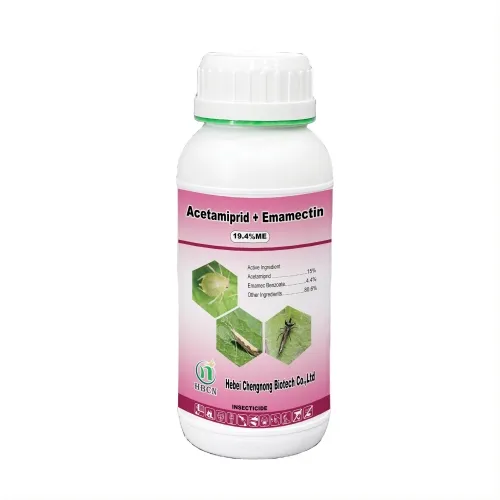
Nov . 21, 2024 02:58 Back to list
nicosulfuron 40g/l sc companies
Understanding Nicosulfuron 40g/L SC A Comprehensive Overview
Nicosulfuron, a systemic herbicide belonging to the sulfonylurea family, has emerged as a vital chemical agent in modern agricultural practices, particularly in the management of grass weeds in crop production. With an active concentration of 40g/L, the suspension concentrate (SC) formulation enhances its effectiveness, allowing for efficient application across various crop settings. This article delves into the properties, applications, company offerings, and environmental considerations surrounding Nicosulfuron 40g/L SC.
Chemical Properties and Mechanism of Action
Nicosulfuron works by inhibiting the activity of the acetolactate synthase (ALS) enzyme, essential for the synthesis of branched-chain amino acids in plants. By disrupting this pathway, Nicosulfuron effectively prevents the growth of target weeds, leading to their eventual death. This selective action ensures that while broadleaf crops and cereals can thrive, competitive grasses like barnyardgrass, crabgrass, and foxtail are controlled. Its targeted approach not only enhances crop yields but also reduces the need for multiple herbicide applications, simplifying weed management strategies for farmers.
Applications in Agriculture
Primarily, Nicosulfuron is utilized in maize (corn) cultivation, where it provides effective control over annual grasses while being non-harmful to the crop itself. The recommended application timing is typically post-emergence but prior to the onset of flowering in the target grasses. Farmers appreciate Nicosulfuron for its flexible application window, which accommodates different planting dates and environmental conditions.
Additionally, Nicosulfuron is often blended with other herbicides to broaden its spectrum of weed control, offering synergistic benefits that enhance overall performance. Its compatibility with various tank-mix partners makes it a valuable component in integrated weed management systems, allowing growers to tailor their herbicide applications according to specific weed pressures and resistance management strategies.
Companies Producing Nicosulfuron 40g/L SC
Several agrochemical companies produce Nicosulfuron 40g/L SC formulations, each providing unique packaging and logistical solutions to meet market demands. These companies range from multinational corporations to regional players, each contributing to the global supply chain of agricultural chemicals.
Some prominent manufacturers include
nicosulfuron 40g/l sc companies

1. Bayer CropScience Known for its extensive portfolio of crop protection products, Bayer offers Nicosulfuron formulations that are optimized for performance and safety, adhering to stringent regulatory standards.
2. Syngenta Another key player in the agricultural sector, Syngenta provides Nicosulfuron with innovative delivery systems that enhance its efficacy and environmental profile.
3. Corteva Agriscience Focused on sustainable agriculture, Corteva develops Nicosulfuron products that align with best practices in integrated pest management, promoting both effectiveness and ecological responsibility.
4. Eastman Chemical Company Known for specialty chemicals, Eastman offers formulations of Nicosulfuron that target specific regional needs, ensuring that farmers have access to effective weed control solutions tailored to their unique agricultural systems.
Environmental Considerations and Resistance Management
As with any herbicide, the use of Nicosulfuron raises concerns regarding environmental impact and the potential development of weed resistance. To mitigate these risks, it is crucial for farmers to adopt comprehensive resistance management strategies, including crop rotation, the use of tank mixes, and adhering to recommended application rates and timings.
Moreover, proper handling and application practices ensure minimal off-target effects, preserving beneficial organisms and groundwater quality. Regulatory bodies continue to monitor the usage of Nicosulfuron, enforcing guidelines that promote responsible agricultural practices.
Conclusion
Nicosulfuron 40g/L SC represents a powerful tool in the arsenal of modern agriculture, allowing for effective weed management in crops like maize. With contributions from numerous companies, its availability has bolstered farmer productivity while addressing the crucial need for sustainable agricultural practices. As the agricultural landscape evolves, continuous research, responsible usage, and adherence to best practices will play pivotal roles in maximizing the benefits of Nicosulfuron while safeguarding the environment.
-
Insecticide Spirotetramat 11% + Thiacloprid 11% SC at Good Price
NewsJul.30,2025
-
Best Abamectin SDS - Premium Quality & Reliable Safety Data
NewsJul.29,2025
-
Agrochemicals Pesticides Solutions for Sustainable Farming
NewsJul.29,2025
-
High-Quality Tebuconazole Fungicide for Crop Protection at Best Price
NewsJul.29,2025
-
Chlorfenapyr 8% + Clothianidin 20%SC Pesticide Mixture for Effective Pest Control
NewsJul.28,2025
-
Best Azoxystrobin Difenoconazole Supplier for Crop Protection
NewsJul.28,2025
